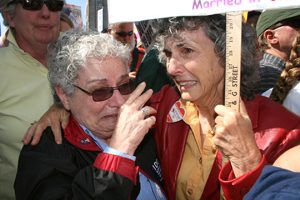The verdict is heartbreaking but the fight is still not over.
Hundreds of people bearing signs proclaiming, “Marriage Equality For All” and “Separate is Not Equal ” gathered outside the State Supreme Courthouse in San Francisco to await the courts ruling on the Constitutional challenge to Proposition 8—the proposition that stripped gay and lesbian Californians of their right to marry. Rather than having the decision read by a spokesperson, the announcement of the ruling was handed out as a press release accompanied by a copy of the Supreme Court’s verdict. It made its way through the crowd by word of mouth and was met with boos, tears, cries of disappointment and anger—and cheers from a significantly smaller group of people standing under banners in support of Prop. 8.
The court rejected the constitutional challenge to Prop. 8 by a 6-1 vote. However, it also ruled unanimously that the amendment was not retroactive and that the marriages of the 18,000 couples that wed before the November decision will remain valid.
The majority of the group quickly dispersed and made their way to the corner of Van Ness and Grove, where hundreds of protestors in the shadow of San Francisco’s City Hall locked hands in an act of civil disobedience—or sat down in the crosswalk, blocking off the intersection and shouting out various call and answer protests.
Protestor Emily Drennen, who sat on the protest line in a white wedding dress, was still in shock over the court’s decision. “It hasn’t sunk in. I know when our marriage got annulled in 2004 it took a day or two to settle in and then it just absolutely destroyed me. It’s kind of dehumanizing as a group.”
There were also a large number of people of faith in attendance of both Christian and Jewish denominations who expressed their frustration over the opposition’s use of scripture to justify their anti-gay, anti-civil rights position. “As a Christian I think it’s a total distortion of the whole gospel of Jesus, which was radically inclusive, which is how he got into trouble—radically inclusive,” exclaimed Methodist Pastor Odette Lockwood-Stewart.
“I can quote the Bible saying you’re supposed to kill your children if they sass you,” said Patricia Ross, an Episcopal deacon. Her wife Christie McManus, also a deacon, added, “And it’s an abomination to wear mixed fabrics, if you wear a cotton poly blend, well, that’s against the Bible too. I mean I think there is a core of the Bible about peace, mercy, love and in fact the Bible says all kinds of things about that—way more about that than it does about homosexual relationships.”
There was plenty of optimism in the crowd despite the disappointment over the ruling. Gay rights activist and self-proclaimed Holy Hemptress Sonjia Miles—who first became an activist while working with Harvey Milk—remains hopeful about the future, “I have faith that we will not stop until we overcome. And I know that the gay community will not stop until there is equality and justice for all.”
The protest went on until noon at which time San Francisco police began breaking it up, ultimately more then 175 participants were arrested, cited and released.
The fight is definitely not over. However, the question remains of what to do next. According to a press release sent out by a coalition of gay legal leaders including Lambda Legal, NCLR, HCR and the ACLU the next step is to “Make Change, Not Lawsuits,” counseling against the temptation to pursue lawsuits on the state and especially federal level.
“It is by no means clear that a federal challenge to Prop. 8 can win now, and an unsuccessful challenge may delay marriage even longer, not only in California but in other states, and seriously damage the rights of LGBT people on many other important issues.” The press release further elaborated that the Constitutional arguments that would be used in a federal case would be the same that have been used in cases involving employment, adoption and child custody and a bad judgment in the case could have detrimental ripple effects on these other gay rights issues as well.
The fact remains that gay and lesbian Californians lost their right to marry at the ballot box and that is where they suggest they focus our efforts to overturn the ban. So rather than head to the courthouse, they counsel working to continue to shift the paradigm, “we need to talk to our friends, family and neighbors and help them to understand why the denial of the freedom to marry is wrong.”
In a statement released by NCLR Legal Director Shannon Minter, he expressed his disappointment, “the decision is a terrible blow to the thousands of Californians who woke up this morning hoping and praying their status as equal citizens of this state would be restored. The court’s decision has crushed those hopes and made painfully clear that we must go back to voters to restore equality.”
Now is the time to begin organizing. Visit nclrights.org to learn more and offer donations. Or for those in the Fresno area—or who are Fresno-bound—Meet in the Middle 4 Equality has scheduled an equality march and rally Saturday, May 30.
For more information on these events visit meetinthemiddle4equality.com.
